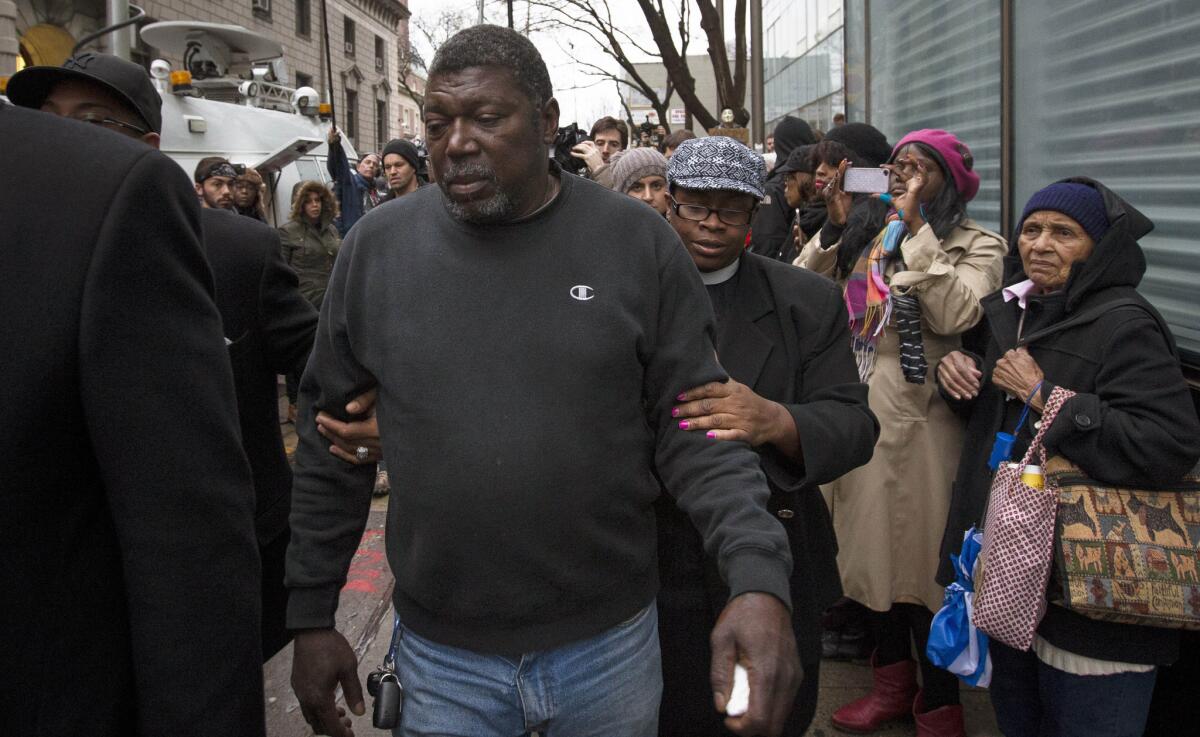NYPD inspector general’s report faults discipline on chokeholds

- Share via
New York police received little or no discipline from their superiors in 10 recent case involving the use of the banned chokehold, the city’s first report by the Police Department’s inspector general said on Monday.
The report comes as the city continues to reel from the July death of Eric Garner, who was selling loose, untaxed cigarettes and was placed in a chokehold during a confrontation with police in Staten Island.
That incident touched off demonstrations and further strained relations between police and Mayor Bill de Blasio, who said he understood the frustration and worry behind the demonstrations that followed a grand jury’s decision in December not to charge the officers.
As a sign of their displeasure with City Hall, many police officers turned their backs on De Blasio during the funerals for officers Wenjian Liu and Rafael Ramos, slain last month in Brooklyn. Police have also reportedly slowed down their enforcement of some minor laws such as summonses.
The inspector general’s office, headed by Philip Eure, was created last year by the City Council in response to complaints about how police enforced the stop-and-frisk policy, which critics alleged targeted blacks and other people of color. Then-Mayor Michael Bloomberg and then-Commissioner Ray Kelly both opposed creating the office, but the council overrode Bloomberg’s veto.
Originally scheduled to be released last month, the report was pushed back after the two police officers were fatally ambushed in their patrol car by a man who said he wanted to kill police officers in the wake of the Garner case and the shooting of an unarmed black man in Ferguson, Mo., by a white police officer. Ismaaiyl Abdullah Brinsley, the suspect in the Brooklyn cop shooting, killed himself moments after the attack.
The report looked at 10 chokehold cases substantiated by the Civilian Complaint Review Board between 2009 and 2014. The Garner case was not among those examined.
In four of the cases, police used chokeholds as a first act against citizens who had confronted them only verbally, not physically.
“While the substantiated use of prohibited chokeholds by members of the NYPD in any context is troubling, the fact that several of the subject officers in the 10 cases reviewed by OIG-NYPD used chokeholds as a first act of physical force and in response to mere verbal confrontation is particularly alarming,” the report stated.
“Rather than using communication skills and approved tactics to de-escalate tense encounters with members of the community, these officers immediately turned to a prohibited and dangerous physical act to try to control the situation,” the report said.
Department policy bans the use of the chokehold, which is defined as “any pressure to the throat or windpipe, which may prevent or hinder breathing or reduce intake of air,” according to the inspector general’s report. But the report found that “at least historically, the disciplinary process is complex, multi-tiered, and often delivers inconsistent results.”
In all 10 cases the NYPD ignored the Review Board’s recommendations. In nine of the cases, the board recommended the toughest sanction possible, departmental charges. In every case the cop got lesser punishment ranging from no punishment to the loss of vacation days.
In six of the cases, Kelly imposed lesser punishments or none at all.
“The lack of transparency regarding the police commissioner’s disciplinary decisions in these cases deprives CCRB — and by extension the public — of an important window into how NYPD works and how it holds its officers accountable when they violate the rules,” the report said.
“Whether such data are indicative of a broader trend” will be studied further, along with effectiveness of police training including the instruction to “use minimum necessary force,” the report added.
Follow @latimesmuskal for national news
More to Read
Sign up for Essential California
The most important California stories and recommendations in your inbox every morning.
You may occasionally receive promotional content from the Los Angeles Times.














